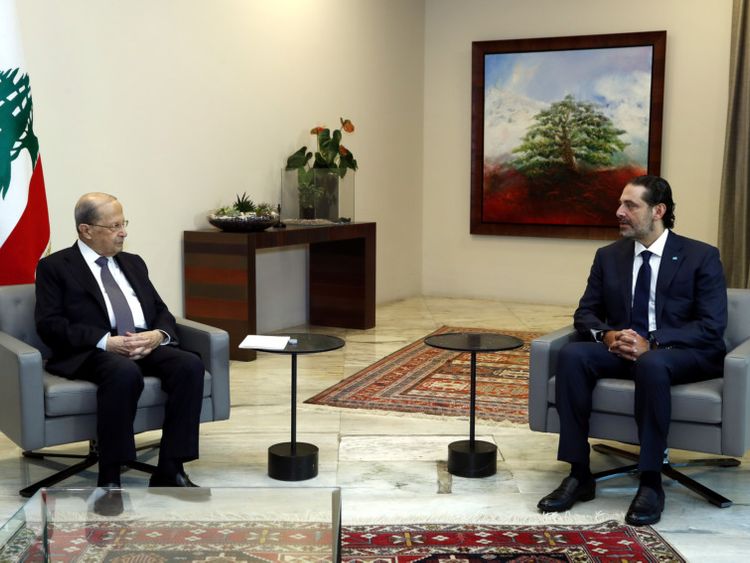Gebran Basil’s tensions with ex-PM come to fore; Hezbollah and Aounists don’t see eye to eye

Damascus: Two disputes are rapidly unfolding in Lebanon, affecting the formation of a new cabinet which ought to have happened last week but has been postponed until next October 22. Both problems are linked directly to President Michel Aoun and his son-in-law Gebran Basil, an ex-foreign minister who heads Aoun’s Free Patriotic Movement (FPM).
Showdown with Hariri
Last week, former Prime Minister Saad Hariri nominated himself for the premiership, exactly one year after a popular revolution forced him to step down. He automatically received support, albeit unofficial, of 61 out of 128 MPs. His own Future Movement stood firmly behind him, with its 20 MPs, and so did Hezbollah and Amal (a united bloc of 30 MPs), the Social Progressive Party of Druze leader Walid Jumblatt (9 seats) and the Marada Movement of Suleiman Frangieh (3 seats).
FPM said no, however, due to boiling disagreement between Hariri and its leader, Basil, as did the other main Christian party, the Lebanese Forces.
Basil has insisted that if Hariri returns to power, then so would he, given that they had served together in government between 2016-2019. Hariri wants to avoid a Basil comeback at any cost, given that much of the public outcry of the Lebanese Revolution was directed towards Basil personally, accusing him of autocracy, misuse of public office, and corruption.
To free himself from any obligation towards Basil, Hariri has suggested assembling a cabinet of technocrats, where ministers are chosen for their professional merit, rather than political affiliation. That means that Basil can — in his capacity as a party leader — nominate figures for cabinet posts, but not assume them himself.
Basil firmly rejected the proposal, claiming that Hariri himself is no technocrat. He added that both he and Hariri were equal, both being party leaders with a large bloc in Parliament. If one returns to office, then so must the other.
A 2016 agreement between Hariri and Aoun resulted in the Future Movement supporting Aoun for president, and the FPM accepting Hariri as premier. There is no clause in the verbal agreement that forces Hariri to accommodate both Aoun and his son-in-law. Basil nevertheless has the ear of the Lebanese president. He managed to talk him into postponing the cabinet formation talks, insisting that no cabinet will pass without him. Fearing by-elections for parliament that would erode his party’s 24 seat majority, Basil also managed to talk the president into calling them off until next January. They were supposed to take place by no later than October 11.
Good friend
Instead of Hariri as premier, the Aounists are considering naming either Jamal Kebbe or Jawad Adra as prime minister, or keeping the incumbent Hassan Diab, who had been handpicked for the job by Basil himself. Kebba is a Georgetown University-educated Lebanese employee of the World Bank, handling affairs of the GCC, who is reportedly close to Basil while Adra is a good friend of the president.
“Hariri has made it clear to everybody that his cabinet will not last for more than six months,” explained Lebanese political analyst Fadi Akoum. “It had one objective only, to salvage what can be saved of Lebanon.” Speaking to Gulf News, he added: “This might make it easier for the FPM to stay away, given that this is not a cabinet that will stay for long.”
If Basil decides to stay out of the government, however, then he would have to turn to the opposition for what remains of his father-in-law’s term, which ends in October 2022. “That would trigger ridicule,” said Ghassan Al Hajjar, the editor of the popular Beirut daily Annahar. “How can he be in the opposition when his party is that of the president?”https://cbd47812404ce7d9f5b80d91fd9c0a02.safeframe.googlesyndication.com/safeframe/1-0-37/html/container.html
Ruptures with Hezbollah
And if Aoun’s spat with Hariri were not enough, then came an alarming quarrel with Hezbollah, his main ally in Lebanese domestic politics. Hezbollah had approved the commencement of UN-sponsored Lebanese-Israeli talks starting October 14, conditioning however that they are not direct nor carried out by civilian figures, neither from the Foreign Ministry or the Presidential Palace. These were technical talks, they insisted, with no political agenda, aimed exclusively at demarcation of Lebanon’s maritime border with Israel and ending dispute over 860 square kilometres of what looks like gas-rich waters.
Aoun said yes, but unilaterally added civilians to the Lebanese delegation, who were asked to report to him directly rather than to the delegation’s head General Bassam Yassin. Aoun’s insistence to get more involved in the talks are due to an increased feeling of weakness and helpless that engulfs the president, who has suffered from recent back-to-back setbacks and character assassination, starting with the financial meltdown leading up to the blast at Beirut airport on August 4.
Dangerous low
His decision to attach civilians to the talks has raised the ire of Hezbollah. They did not criticise him publicly but through the Hezbollah-backed newspaper, Al Akhbar. Hours before the negotiations commenced, Hezbollah issued a statement of condemnation, bringing their relationship with the FPM to a dangerous low.
Hezbollah had originally tried containing the crisis, asking to Aoun to reconsider, but he refused. This was no small issue, reported Al Akhbar, which was the first to say that the Hezbollah-Aoun agreement of 2006 was now at stake. Back then, they had agreed to support Aoun’s bid for the presidency and he promised to support their arms. He fulfilled his part of the pact during the war with Israel later that summer, and later when they entered the Syrian conflict in 2012. They did their share in 2016, making him president of the republic.
“Their agreement of 2006 has changed,” added Hajjar who, speaking to Gulf News, concluded: “The chances of its revival are declining, but it has not been declared dead yet.”
Gulf News

Leave a Reply
You must be logged in to post a comment.